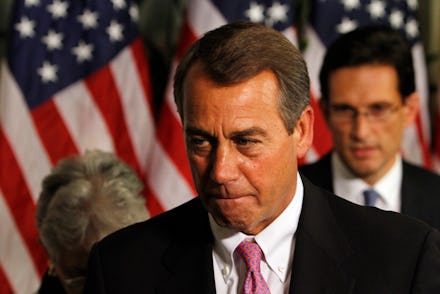New Government Shutdown Deadline: Why a Budget Deal Won't Happen

With each passing day, Congress looks more like a sad imitation of government than an actual legislative body. According to the bill that ended the government shutdown and debt ceiling fight, Democrats and Republicans need to reach a long-term agreement on taxes and spending. If there isn't an agreement by January 15, the government shutdown starts again.
Of course, nobody really thinks a long-term agreement is possible. Republicans and Democrats are too polarized to reach common ground. Republicans have consistently refused to raise tax rates and Democrats will never agree to a deal that doesn't raise taxes. More importantly, there's no political reason for President Obama and the Democrats to bargain in good faith. They decisively won the shutdown and debt ceiling fights. The Republican Party ended up with the lowest approval rating in the history of the Gallup Poll, and eventually agreed to all of Obama's demands. Obamacare was not changed by the bill to reopen the government. Aside from the token victory of stricter income verification on the Obamacare exchanges, Republicans got nothing for the shutdown and Democrats won a major political victory. The thought of repeated shutdowns until the midterm election makes Democrats celebrate, not cringe.
In an ideal world, Congress would put country above party and reach a compromise where liberals and conservatives made sacrifices to pass workable legislation. But that's so last century. The type of government that rejected extremism and compromised on major issues — the type of government that passed great laws like tax reform in the 1980s and welfare reform in the 1990s — that government is a causality of modern America. As the country has gotten more polarized, so have our politics.
The 2012 elections were the most polarized in modern American history. President Obama won, but only 7% of Republicans voted for him. In contrast, in 1980, 20% of Democrats voted for Ronald Reagan. Although there are more independents now than in 1980, most of those independents consistently vote for the same party. When Reagan passed his landmark tax cuts, 37 Democrats voted for it. Although some of those votes were from conservative Southerners who would be Republicans today, some came from centrist Democrats. Those senators may have had qualms about the tax cuts, but they were responding to pressure from Democratic voters who supported Reagan. That pressure doesn't exist anymore, and neither do the moderate politics it causes.
Few members of Congress rely on voters from the other party; just 17 Republicans are in districts won by President Obama, making them more afraid of a primary challenge than a general election. Primary challenges defeated popular and long serving Republicans like Dick Lugar, Bob Bennett, and Cliff Sterns. With the exception of Joe Lieberman, primary challenges have been less common for Democrats, but their moderates have retired or been defeated as the Midwestern states they represented became solidly Republican.
With Congress now voting on strict party lines, a president who wants to get bills passed needs to have their party control both chambers of Congress. That's why President Obama has no interest in negotiating or compromising with Republicans. Obama knows his only chance to pass big pieces of legislation on immigration and gun control is to win back the House of Representatives. Since so few Congressional districts are competitive, Obama needs to not just lower Republicans' approval ratings, but keep it at record lows. The best way to do that to continue having unpopular shutdowns and debt ceiling fights, then blaming Republicans for them.
We only have ourselves to blame for the brutal partisanship. Politicians are doing what wins them re-election and lets them pass bills. This is nothing new, but now it forces our government to lurch from crisis to crisis while ignoring real problems.